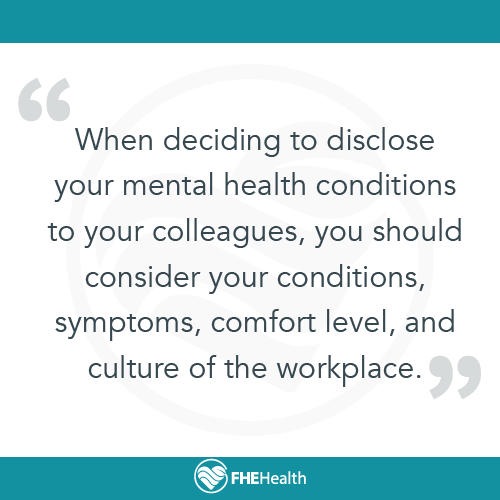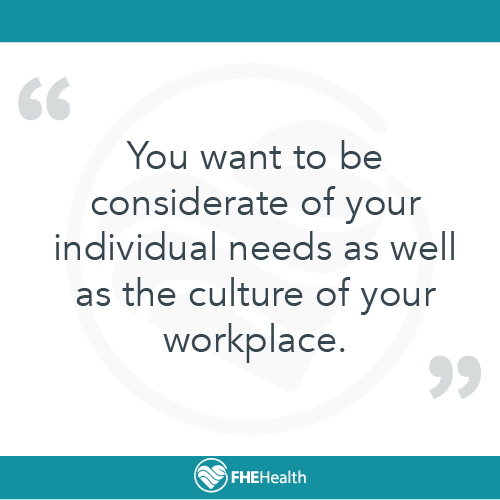
Employment is a weekly reality for most people, but it often comes with many challenges. For individuals in recovery or those struggling with other mental health disorders, it can be challenging to be transparent at work.
Most individuals spend the majority of their day at work. Therefore, it’s only natural to develop relationships with colleagues. It would be fair to say that one of your coworkers may ask you to unwind from a long day at the office by joining them for a drink. You may even find yourself struggling with anxiety or depression at work and feel like you are the only person in the office struggling with mental health.
Whether you struggle with anxiety, ADHD, depression, bipolar disorder, or even substance abuse disorder, it can be challenging to manage your feelings in the workplace when you feel isolated from sharing your struggles. Are you shifting the focus away from your performance? Are you setting yourself up for failure by way of not getting picked for the next promotion or big project if you confess your mental health conditions? Thankfully, there are laws that protect individuals from discrimination, but that does not mean your fears of opening up about your mental health in the workplace are not valid.
Here are some tips for knowing if and how you can discuss with your colleagues about your mental health.
Find Grace and Understanding Where You Are
 Almost every human being feels secure when he/she is prepared and has a plan of action. There is no textbook “right” or “wrong” time for you to discuss your mental health conditions with your colleagues or boss. However, when deciding to disclose your mental health conditions to your colleagues, you should consider your conditions, symptoms, comfort level, and culture of the workplace.
Almost every human being feels secure when he/she is prepared and has a plan of action. There is no textbook “right” or “wrong” time for you to discuss your mental health conditions with your colleagues or boss. However, when deciding to disclose your mental health conditions to your colleagues, you should consider your conditions, symptoms, comfort level, and culture of the workplace.
Despite the more open cultural conversations, surrounding mental health, it is still a topic of conversation that is very delicate in nature. Disclosure is a very personal decision. If you are not struggling with the conditions of your mental health disorder and your work performance is unaffected, you may not feel comfortable sharing your medical history – and that is OK.
However, if you notice your work performance or your quality of life is being negatively affected by your mental health disorder, you may want to disclose some of your struggles to your boss or colleagues. This is especially true if you feel you may need some accommodations that center around time off to deal with your mental health. It is important to remember that if you request time off for an emergency or personal matter, you may be questioned about your overall wellbeing and may feel compelled to share more than you initially planned. It is always beneficial to have a plan to address your mental health condition if you think it may be interfering with your everyday life.
Find Appropriate Timing
 As mentioned above, there is no “right” or “wrong” time to discuss your mental health. However, you want to be considerate of your individual needs as well as the culture of your workplace. If you have an open and carefree relationship with your boss and colleagues, you may find it easier to have a transparent conversation about your mental health. On the contrary, if you work in a rigid, highly structured atmosphere, you may find it more challenging to open up about your struggles.
As mentioned above, there is no “right” or “wrong” time to discuss your mental health. However, you want to be considerate of your individual needs as well as the culture of your workplace. If you have an open and carefree relationship with your boss and colleagues, you may find it easier to have a transparent conversation about your mental health. On the contrary, if you work in a rigid, highly structured atmosphere, you may find it more challenging to open up about your struggles.
Writing a script and pre-planning what you want to say will ensure your message is delivered exactly how you want. If you have poor communication with your boss or your colleagues, you may want to consider visiting your HR department first. Many corporate businesses offer services for these mental health-related incidents. Many of the professionals in your HR department typically have the proper training to handle complex situations such as disclosing mental health.
Many individuals do not find it appropriate to disclose their mental health upon hiring, in fear of not getting a position. However, if you have experienced symptoms of your mental health disorder that may disrupt your quality of work, it may be best to share these details during the hiring process. You can be delicate and brief upon disclosing information about your mental health by putting it into context. This will prevent your mental health condition from being seen as the primary point the interviewer remembers about you. If you are a part of a support group or 12 Step Fellowship, it may be a good idea to ask others how they may have approached this situation.
Maintain Your Privacy and Know the Laws
 Regardless of what you choose to disclose to your colleagues or boss, you need only to share what you feel comfortable with and at your discretion. You are not required to go into a lengthy, detailed description of your family’s medical history with depression, every manic episode you’ve experienced, or share the explanation of how your anxiety manifests. For example, if you have ADHD, you may want to share with your colleagues that you may struggle to concentrate and has occasionally affected your ability to work. It is also appropriate to mention you have a medical condition without explicitly naming the condition.
Regardless of what you choose to disclose to your colleagues or boss, you need only to share what you feel comfortable with and at your discretion. You are not required to go into a lengthy, detailed description of your family’s medical history with depression, every manic episode you’ve experienced, or share the explanation of how your anxiety manifests. For example, if you have ADHD, you may want to share with your colleagues that you may struggle to concentrate and has occasionally affected your ability to work. It is also appropriate to mention you have a medical condition without explicitly naming the condition.
It’s not uncommon for an individual to feel uncomfortable discussing mental health issues, but you must know that you are not alone. In fact, society is slowly becoming more accepting and supportive of such issues surrounding mental health. The open dialogue surrounding mental health has cultivated more acceptance and overall healing for the individual struggling.
Despite how awkward or anxious you may feel about discussing your mental health disorder, remember you are protected. The Americans with Disabilities Act “prohibits discrimination against persons with disabilities in employment…” The act further explains that “Anyone known to have a history of mental disorders can be considered disabled.”
Essentially, this act ensures that you will be protected against your employer taking action after you disclose your mental health condition. The law allows accommodation for qualified individuals (within a reasonable extent). Depending on the level of impairment, individuals may receive accommodations such as flexible hours and scheduling as well as working from home privileges. These types of accommodations are protective measures for individuals struggling with mental health conditions. Rather than trying to take a few personal days in hopes the depression passes, you may want to have an open, honest conversation with your boss to see about potentially working more flexible work hours and a revised schedule.
Most importantly, if and when you decide to discuss your mental health issues with someone of authority, the law requires that the information you disclose must remain confidential. It can feel seemingly overwhelming to share this sensitive information with one person in the workplace, particularly if you are in fear of the whole office knowing about your mental health disorder. As you begin to make a plan to disclose your mental health conditions with your colleagues, you will most likely realize you are not alone. Mental health stigmas are not as prominent as they once were, and thankfully, many businesses now have an “open-door policy” in which employees can discuss matters surrounding mental health openly and without judgment.






